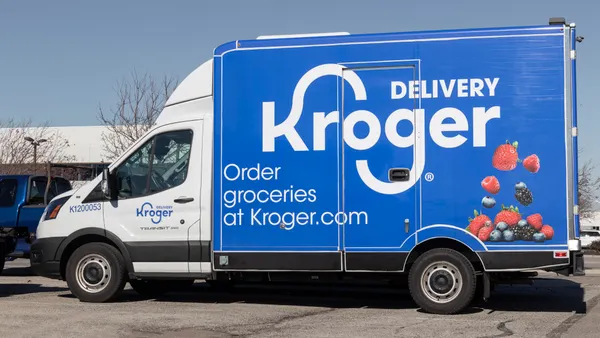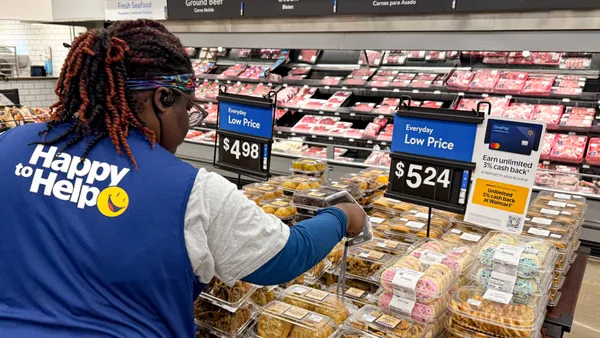Dive Brief:
- Food News Business reported that Good Catch Foods, which makes plant-based seafood alternatives, received $8.7 million in capital funding led by its founder, New Crop Capital, and a syndicate of investors, including PHW Group, Thrive Market, Fresh Direct, Stray Dog Capital, Clear Current Capital, VegInvest, Rocana Capital, Blue Horizon, EverHope Capital, Baleine & Bjorn Capital, M13 and Starlight Ventures.
- The Newton, Pennsylvania-based company uses a six-bean blend to create faux fish products like fish-free tuna, crab-free cakes and fish-free sliders, which should look and taste like the real thing. Good Food uses pea, soy, chickpea, lentil, fava and navy beans to create its “fish” foods, the report noted.
- The funding is a boon for Good Foods as it works to expand the reach of its sustainability mission of helping save the ocean's ecosystem. Paul Wesjohann, chief executive officer of PHW Group, one of Europe’s largest poultry producers, also told Food Business News that investing with Good Foods aligns with his company's goals of bringing sustainable, clean foods to the U.S.
Dive Insight:
As many consumers embrace plant-based meat alternatives, the move into faux seafood seems like a logical next step for food companies. Major protein producers such as Tyson and Cargill may have focused their efforts on creating imitation beef and poultry, but smaller companies like Good Catch are turning their attention to seafood. The move could be well timed as the desire to consume less food that negatively impacts the environment grows. Mintel reported 35% of Americans get most of their protein from sources other than red meat, the production of which emits 20 times more greenhouse gases than plant-based proteins like beans or lentils. In the oceans, overfishing has become a large issue as the populations of Atlantic halibut, bluefin tuna, monkfish and more are threatened.
San Francisco-based startup Terramino Foods has created a faux salmon burger out of fungi and algae, according to Fast Company. The product reportedly looks, tastes and smells like the real thing. Like fish, the imitation salmon is a complete protein source with omega-3 fatty acids, but it contains less fat. The company plans to scale up production of its salmon burger in 2019 and make it cost competitive with the average wholesale price of salmon. Terramino hopes to sell its products to restaurants by the end of this year and also develop a fish fillet alternative.
Another company, Ocean Hugger Foods, is creating faux seafood using vegetables instead of soy, pea or wheat protein with oils, gums and starches. Foodable Network noted chef James Corwell launched Ocean Hugger after visiting the Tsukiji fish market in Tokyo and observing more than 100,000 square feet of endangered yellowfin and bluefin tuna sell out in a morning.
The large investment in Good Catch Foods and the production by companies like Terramino and Ocean Hugger are not the only signals that the faux seafood market is heating up. Impossible Foods, the California startup behind the popular plant-based Impossible Burger, noted its intention to develop a plant-based fish product. Like the Impossible Burger, the product would also contain heme, an iron-containing molecule extracted from soybeans using technology patented by company founder and CEO Pat Brown. Given the popularity of the Impossible Burger and its competitor Beyond Burger from Beyond Meat, it's not a stretch to imagine a plant-based salmon burger attracting consumer interest — as long as it delivers the taste and mouthfeel that consumers expect from real salmon.
It’s interesting to note a European poultry producer PWH Group is diving into the American faux seafood market in such a big way, but it follows on the heels of other European companies forming U.S. partnerships in the alternative-protein market. A few weeks ago, JUST entered into an agreement in principle to produce and distribute its vegan JUST Egg product in Europe with Italy-based Eurovo, according to a company statement and CEO Josh Tetrick. Under the agreement, Eurovo, the continent's leader in producing packaged, pasteurized and dried eggs, will manufacture and distribute JUST Egg in its existing facilities. The European company will sell the product — which may have a different name, due to regulations — in retail and foodservice channels, then pay royalties to JUST.
Consumers have shown strong interest in plant-based “burgers” and other meat alternatives, but they expect flavor and texture to match the original. While food companies have been working for a while to create faux hamburger that “bleeds,” forays into alternative seafood are still in their infancy. A boost in investment in companies like Good Catch Foods, however, could move help the products make the move into mainstream.









